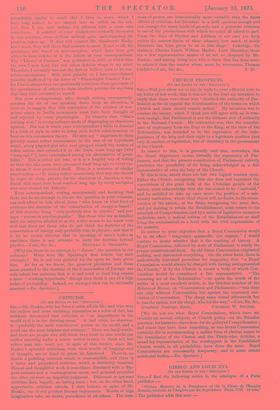CHURCH PROSPECTS. [TO THE EDITOR OF THE "SPECTATOR. "]
SIR,—Will you allow me to say, in reply to your editorial note to' my letter of last week, that it was not in the least my intention to imply that there were those wbo "doubted the authority of Par- liament as far as regards the determination of the terms on which Church and State should remain united." My intention was to combat the theory, which I think you will agree with me is com- mon enough, that Parliament is not the ultimate seat of authority in the National Church. My contention was, that the transfer- ence of supremacy froth the Pope to the King, at the time of the Reformation, was intended to be the expression of the inde- pendence of the laity and their right to a legitimate position (not. only in matters of legislation, but of doctrine) in the government of the Church.
In answer to this, it is generally said that, nowadays, the the Royal Supremacy means virtually the supremacy of Par- liament, and that the present constitution of Parliament entirely precludes the possibility of its being acknowledged as a fair representative of even the laity of the Church.
If this is true, surely there are but two logical courses open. Either the Church, recognising that she does not represent the convictions of the great bulk of the Christian people of the nation, must acknowledge that she has ceased to be " national," and be satisfied to take up once more the position of a mis- sionary institution, whose chief object will, no doubt, be the recon- version of the nation; or the State, recognising the same fact, and yet desiring to retain the Establishment, must return to the principle of Comprehension, and by a series of legislative measures undertake such a radical reform of the Establishment as shall bring the ecclesiastical on a level with the civil organisation of the country.
In answer to your objection that a Royal Commission would
be in its effect "temporary, spasmodic, not organic," I would venture to doubt whether that is the teaching of history. A Royal Commission, followed by Acts of Parliament, is surely the proper constitutional form. In old times, Convocation originated nothing, and obstructed everything. On the other hand, there is undoubtedly historical precedent for supposing that " a Royal Commission would always be charged with having misrepresented. the Church," if by the Church is meant a body of which Con- vocation would be considered a fair representative. "The crowning act of the Reformation "—to quote the words of the writer of a most excellent article, in the October number of the Edinburgh Review, on "Convocation and Parliament—"was done not only without Convocation, but against the expressed con- viction of Convocation. The clergy came round afterwards, but it was the nation, not the clergy, who led the way."-1 am, Sir, &c., [We do not see what Royal Commissions, which have sat recently on several subjects of Church policy—on the Ritualist question, for instance—have done for the policy of Comprehension ; and where they have done something, as one Royal Commission certainly did in recommending a milder form of clerical assent to the formularies of the Church and the Thirty-nine Articles, a sound lay representation of the worshippers in the Established. Church would, in all probability, have done the same. Royal Commissions are necesssarily temporary, and to some extent accidental bodies.—En. Spectator.]






































 Previous page
Previous page